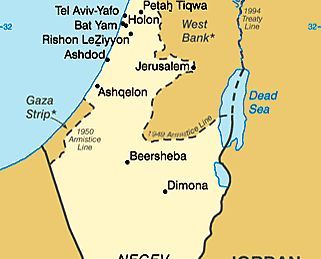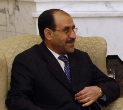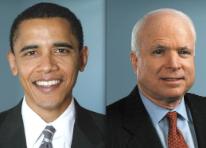So after resigning from office, Ehoud Olmert goes on the record about the need for Israel to make serious concessions in the West Bank, East Jerusalem and the Golan Heights: Who thinks seriously that if we sit on another hilltop, on another hundred meters, that this is what will make the difference for the state of Israel’s basic security? As Matt Eckel over Foreign Policy Watch puts it in so many words, Great, now you tell us. But the timing isn’t only bad because Olmert no longer has the power to act on his newfound convictions. It also puts his […]
Middle East & North Africa Archive
Free Newsletter
THE U.S. FINANCIAL CRISIS — Not surprisingly, a wide cross-section of the world press is having a field day with the U.S. financial crisis and its political implications. A couple of typical samples: In the Italian left-of-center newspaper La Repubblica, foreign policy and U.S. specialist Vittorio Zucconi unleashes a scathing commentary on the Bush administration. The roots of the crisis, Zucconi writes, are not financial, nor economic, but political. In his lame address to the nation Bush Wednesday blamed everybody but himself and his government for the crisis, but the reality is that for nearly eight years, “America has been […]

The next prime minister of Israel will face daunting challenges, from pursuing a risky peace deal with the Palestinians and perhaps Syria, to navigating a dangerous confrontation with Iran, whose nuclear program many in Israel consider an existential threat. Before the new Israeli leader can plunge into these life and death foreign policy issues, though, she (or he) will first need to negotiate the treacherous rapids of Israel’s domestic political waters. Israeli Foreign Minister Tzipi Livni is doing just that as she works to secure the office of prime minister. Ironically, the man in the strongest position to affect her […]
Janine Davidson at Intel Dump cites a Tom Johnson and M. Chris Mason piece in the Atlantic, All Counterinsurgency is Local, before discussing the tension between the tactics of counterinsurgency, which emphasize engaging with governance and authority at the most immediate (ie. local) level, and the strategy of counterinsurgency, which emphasizes shoring up governance and authority at the national level: [T]he question we need to examine is about tradeoffs. What are we sacrificing from a national or international security perspective when we focus on human security at the local level, as Johnson and Mason suggest? What might an international system […]
Last Thursday, two agents of the German foreign intelligence service, the BND, who had been stationed in Baghdad during the Iraq War in 2003 testified before the intelligence oversight committee of the German Bundestag. The purpose of the hearing was to determine what exactly they were doing in Baghdad at the time and, above all, whether the information they reported back to BND headquarters in Pullach could in turn have been used by American military command. The latter possibility is regarded as controversial in Germany and has previously been reported as established fact by the New York Times. (The Times […]
John A. Nagl, 42, is a senior fellow at the Center for a New American Security. He is a retired Army lieutenant colonel, a veteran of both Operation Desert Storm and the current conflict in Iraq, and was one of the writers of the Army/Marine Corps Counterinsurgency Field Manual. He is also the author of “Learning to Eat Soup with a Knife,” published in 2005. In that book he uses archival sources and interviews to compare the development of counterinsurgency doctrine and practice in the 1948-1960 Malayan Emergency with the strategy used in the Vietnam War. Urs Gehriger of the […]
“For those like President Bush who profess certainty as to history’s purpose, using any means necessary to hurry history along to its predetermined destination offers a nearly irresistible temptation. When that conviction is accompanied by a further certainty that on the far side of victory permanent peace awaits, the resort to force becomes almost obligatory. The greater the sense of conviction the easier it becomes to justify any mayhem committed on behalf of big ideas.” –Andrew Bacevich, in a review of “The First Total War: Napoleon’s Europe and the Birth ofWarfare as We Know It,” by David A. Bell, in […]
Sometimes one man’s life can serve as a mirror to reflect the unfolding history of a nation. Keep a watch on the struggles of one Iraqi by the name of Mithal al-Alusi and you will see the drama of Iraq’s modern history and the battle for its future. Sometimes the reflected image emits a hopeful glow. Often, however, it shoots back like a dagger, causing a wince of pain. Alusi, who marches to the sound of his own idealistic beat, has a way of unsettling and angering Iraqis, even as he seeds the soil with new ideas. In recent weeks, […]
Buried at the end of this LAT article on Iraqi PM Nouri Maliki and the decline of American influence in Iraq is this passage: At the same time, Iraqi officials complain about the United States’ failure to create a lasting foundation beyond its military presence. Iran has created more than $2 billion in trade with its neighbor, including fuel and electricity exports. “The Iranians will stay in this place forever till the Judgment Day and the Americans will withdraw,” said Sheik Jalaluddin Saghir, a senior Shiite politician. “The Americans built their status on their military and their political viewpoints. They […]
The IAEA issued its latest Iran report yesterday. Here’s the report itself (.pdf) from the ISIS site, here’s Elaine Sciolino’s write-up for the IHT. The short version is that little has changed in the way of Iranian compliance since the last report. So, declared materials are still accounted for, the nuclear fuel at Bushehr is still under IAEA seal, and Iran’s declared facilities have not been altered or engaged in suspect activity. But it has continued its enrichment program, gaining substantially in the efficiency of its centrifuge cascades and expanding their operation, and has done almost nothing to increase transparency […]
The Arabic Media Shack blog has launched a five-part series on the social, political and historical context of Al Qaeda. Parts One and Two are already up and they’re worth a read. The short version is that regardless of its relative operational strength today as opposed to seven years ago, Al Qaeda is at its very origins an essentially weak movement, issued from a longer historical current that had largely spent itself by the time its last lingering fanatics switched tactics to target the U.S. directly. Tactically dangerous by the nature of the terrorist threat, yes, but not a longterm […]
To follow up a little bit on my post from Tuesday, it’s already obvious that “the Surge” has become a sort of political shorthand that means different things for different people. I was using it as shorthand for the political message it sent to the various Iraqi factions, namely that American forces would have to factored into the cost-benefit analysis of armed conflict so long as President Bush was in office. The problem of assigning causality, of course, is that the decision to increase troop strength in Baghdad didn’t happen in a vacuum, but rather in the aftermath of the […]

WASHINGTON — Among the gravest risks to the continuing improvement of the situation in Iraq is that Sunni militias now allied with the United States will not be successfully integrated into Iraqi Security Forces or find employment in the civilian economy, say Iraq analysts and U.S. government officials. But independent observers and U.S. officials differ sharply in their assessments of the possibility of a reversal in the Sunni “Awakening,” which is almost universally credited as a significant factor in recent reductions in violence. The Awakening movement began in earnest in 2006 in Iraq’s Anbar province, when U.S. commanders took advantage […]
One country has already applied an arms embargo on Georgia before the Russians even presented their draft resolution to the UN Security Council. Nicaragua? Nope. Israel. Here’s Haaretz: The officials say the blanket directive was decided upon this week because Israel is concerned about damage to its relations with Russia. For the same reason, Israel decided to stop most weapons sales to Georgia even before the Russia-Georgia war last month. One of Israel’s primary concerns is that Russia could sell Iran advanced weapons, including anti-aircraft missiles. Israel had previously supplied drones and urban warfare training to the Georgian military. (That […]

NEW YORK — Both candidates for President of the United States agree that Iran’s pursuit of nuclear technology is a serious threat to national security, but neither has presented a serious strategy for dealing with the problem on the campaign trail. One seems to think he can talk Iran out of its nuclear program without specifying what he’d say to change the equation. The other summed up his strategy by inserting a few bombs into an old Beach Boys song. Campaign rhetoric rarely becomes policy, especially in foreign affairs, and the Iranian question is no exception. Certainly Barack Obama will […]
It’s admittedly been a while since I wrote about Iraq, which is a testament to the ways in which that conflict has become a mature stabilization operation. Twenty-three U.S. soldiers dead in August is twenty-three too many. But the security gains since January 2007 are enormous and game-changing. I was opposed to the Surge when President Bush announced it, I’ve been skeptical of the weight it’s been given as a causal factor of the decline in violence, and I remain unconvinced that it has accomplished its ultimate strategic goal of ensuring that Iraq’s ethnic, sectarian and factional conflicts are resolved […]
In the Sergio Leone-inspired, and admittedly simplistic, formulation of the above headline, Iraq is the good, Somalia is the bad, and Pakistan’s Federally Administered Tribal Areas (FATA) are the ugly. The must-read from today’s media roundup of commentary concerns Iraq and comes from CNAS’s Nagl, Kahl and Brimley. The three analysts recently returned from Iraq advise policymakers on “How to Exit Iraq,” saying the answer has little to do with “‘all in’ or ‘all out’ way that Iraq is debated in Washington” at the moment. The most worrying piece of analysis I saw in today’s papers assesses U.S. and Ethiopian […]
